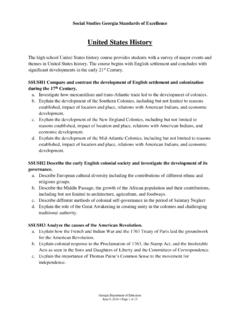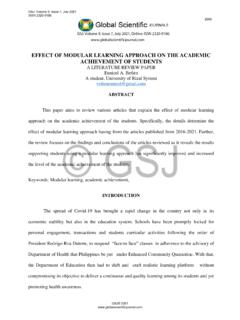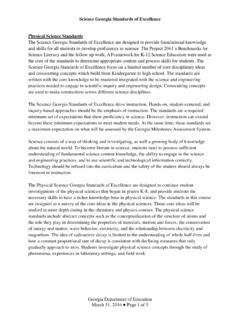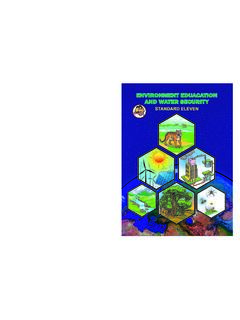Transcription of TEACHING PORTFOLIO - Holly Ann Garnett
1 Holly Ann Garnett - TEACHING PORTFOLIO - 1 TEACHING PORTFOLIO Holly Ann Garnett PhD Candidate, Department of Political Science, McGill University Address and Contact Information here. CONTENTS TEACHING Philosophy .. 2 TEACHING Experiences .. 4 Courses Taught .. 4 TEACHING Assistantship .. 4 course Development .. 4 Other Experiences .. 4 Professional Development .. 5 course Evaluations .. 6 Democracy and Development (POI 2207) .. 6 Canadian Politics (POLI 2706).. 8 Introduction to Political Science (POLS 110) .. 9 Sample Syllabi .. 10 Democracy and Development (POLI 2207).
2 10 Canadian Politics (POLI 2706).. 11 Electoral Integrity and Malpractice (e-learning module) .. 12 Holly Ann Garnett - TEACHING PORTFOLIO - 2 TEACHING PHILOSOPHY My TEACHING experiences have ranged from formal course instruction at Nipissing University, a liberal arts college in Ontario, to academic skill development programming at McGill University s TEACHING and Learning Services. Through these experiences, I have taught a broad range of students: traditional undergraduates, graduate students, mature students, first generation students, and members of Indigenous communities.
3 I recognise that students approach the university experience with diverse academic skills, learning needs, backgrounds and interests. My approach to TEACHING therefore seeks to provide opportunities for skill development and active learning, while emphasizing the principles of universal design for learning and the creation of respectful and open learning environments. Firstly, I believe that students must be provided with level-appropriate skill development opportunities for their success in the course and beyond the university environment.
4 My experience has been that students come to university with varying levels of academic skills. For example, first-year students may have never encountered a scholarly journal article before coming to university. To help students learn to critically read these academic texts, I set aside time during one of the first classes to read through an article with students, treating the process as a mission to uncover key pieces of information (research questions, methodology, thesis statement, evidence, and relationship to the course ) in the text.
5 For upper-year students, I focus on adding new skills to this toolkit, including learning how to evaluate methodology and suggest areas for future research. I include skill development seminars on these topics, and others such as academic integrity and the research process frequently in class as part of the course syllabus. For the past four years I have shared my interest in student skill development at McGill University through my work at TEACHING and Learning Services, where I have managed a variety of workshops, panels and conferences, sharing best practices and advancements in higher education pedagogy with graduate student instructors and TEACHING assistants.
6 My TEACHING also employs active learning methods. I use a variety of types of activities in the classroom to reinforce course content and promote critical thinking. For example, while TEACHING about electoral systems, I created sample ballots for a variety of electoral systems, including first-past-the-post, proportional representation, mixed member system, and alternative vote (rank-order) using real political candidates. We conducted elections in class using each of these voting systems. Students were encouraged to consider how the electoral system influenced their decision-making process.
7 They then counted the ballots under each system, and based on the results, we discussed the benefits and drawbacks of each electoral system. This activity made a sometimes dry or confusing subject like electoral systems engaging and relevant. I value learning by doing to improve student engagement and performance. I also prioritize universal design for learning, a principle that focuses on creating flexible learning environments for diverse student needs. After attending an eye-opening workshop on Disability, Universal Design and Access, I revaluated how my course format and materials could prioritize accessibility.
8 One of the simple changes I made was to switch to an online course management system that would provide all materials in an electronic format, in order to be compatible with a variety of software programs that students may use to enhance accessibility. I also designed all assignments to build on each other, beginning with an annotated bibliography and ending with a final term paper. While this was designed to enhance accessibility for students with learning needs, ultimately all students have found this evaluation structure to be helpful as it allowed for frequent feedback and opportunities for improvement.
9 I plan to continue participating in professional development opportunities that will improve my ability to create accessible learning environments. Holly Ann Garnett - TEACHING PORTFOLIO - 3 Finally, I am aware that students approaches to learning are informed by their background and previous experiences. In the field of political science, this is a great opportunity for student engagement if harnessed appropriately. In my lectures, I always include contemporary examples and discussions to relate course material to student experiences.
10 In doing so, I strive to create respectful and open learning environments, where students will gain the confidence to ask challenging questions and an appreciation of diverse responses. I have honed this skill by facilitating faith-sharing groups for students of diverse backgrounds, including international undergraduate and graduate students, at the Newman Centre of McGill University and engaging in inter-faith and ecumenical initiatives in the Montreal community. These experiences have enhanced my ability to engage in and moderate respectful and constructive dialogue on particularly passion-provoking topics, while also expanding own my perspectives.






